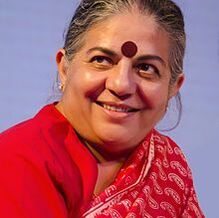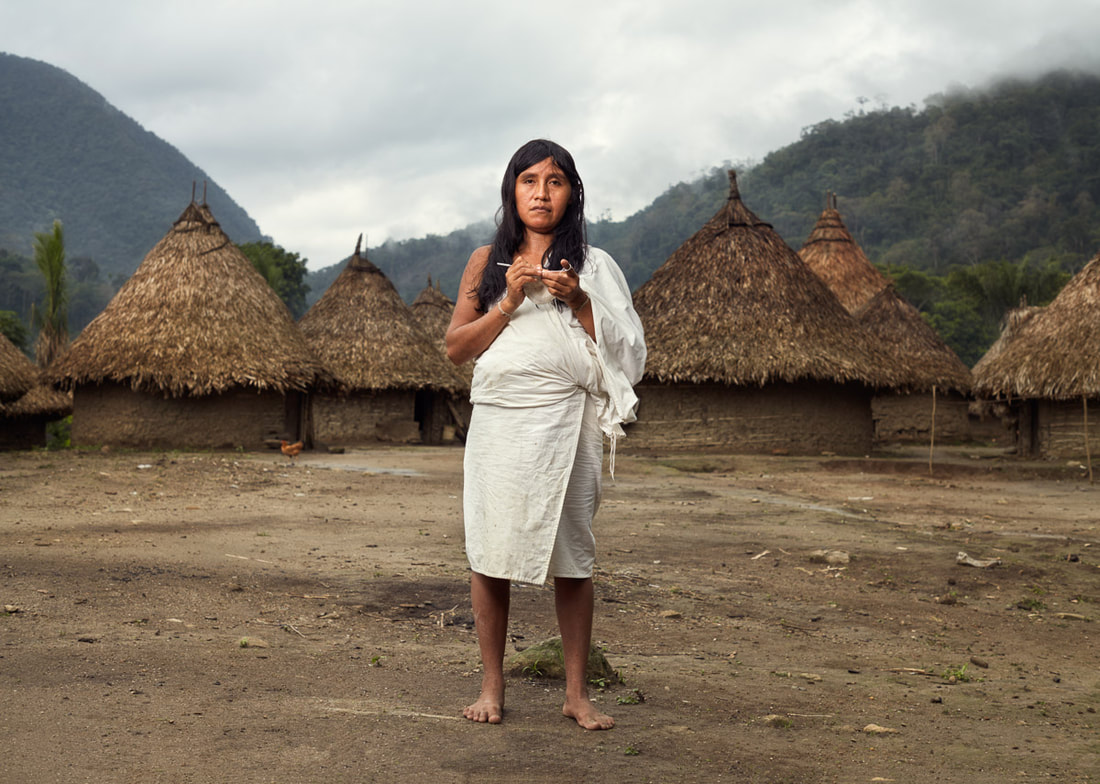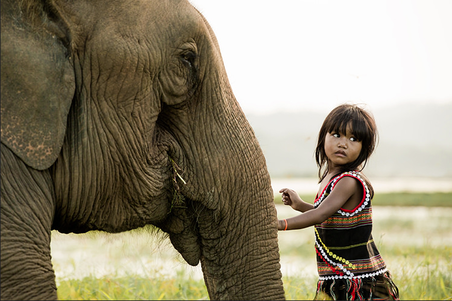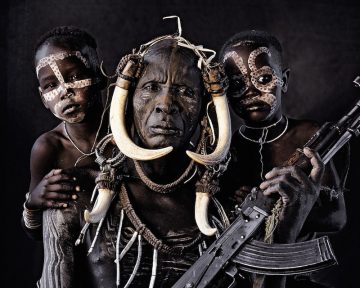The community of knowers you belong to will shape what you accept as knowledge. The fact that you are an IB DP student, whose education is primarily delivered through the medium of the English language, for example, will influence how you know. Most IB DP students have been educated through a more or less westernised method of education, where we place a lot of importance on things such as the scientific method, reason, and mathematics. Your studies generally require you to look at the parts rather than a whole. After all, you are taught different subjects in isolation and you are more than likely going to specialise your compartmentalised knowledge even further at university or higher education and beyond. This compartmentalised approach to knowledge may seem very obvious to you because of the current dominant cognitive paradigm you are most familiar with (and has influenced your thinking). However, historically, things have not always been that way. Ancient Greeks, for example, had a more holistic view of education. Even at this point in time, there are numerous indigenous communities that approach knowledge differently. This awareness of different perspectives and approaches towards knowledge is very important in TOK terms.
Cognitive dominance comes with an ethical price tag. It leads to a hierarchy of ideas and the loss of valuable knowledge. It has a significant impact on knowers. What are the implications of receiving an entire education in a dominant language that may not be your own? What if our learning was holistic rather than compartmentalised and it took place through life rather than in a formal school setting? You may believe that what you know is impressive compared to the knowledge of an indigenous person living in the rainforest. But, how useful is the knowledge you have gathered on the school benches to survive in the jungle? We also tend to think hierarchically when it comes to areas of knowledge and subject disciplines. If your teacher asked your peers to rank the IBDP subjects in order of importance, the arts (and maybe languages) would probably appear at the bottom of the list. Maths and Science, conversely, would probably be rated highly. This is interesting, because indigenous cultures, in contrast, place much more emphasis on songs, stories, dance, art and rituals (things we usually associate with "the arts") to embody knowledge. When we think hierarchically, we forget that there are other ways to look at the world. We think that our way of thinking is the best, that our language is the most important (we tend to assume everyone should learn to speak English) and we ignore the wealth of knowledge (and ways of thinking) we lose through cognitive imperialism and globalisation. We could ask ourselves what kind of knowledge we lose when we are moving to one global culture, speak one dominant language and ultimately have only one way of looking at the world.
When we explore knowledge and indigenous societies, we will undoubtedly come across the theme of language and thought. Every couple of weeks, the last speaker of a language dies and with this person, the knowledge and culture embodied by this language disappears forever. This is significant, because although there exist over 6000 languages in the world, only a couple are spoken globally. Since the language you speak shapes the way you think, the loss of linguistic diversity is significant.
As an international student, you may wish to research cultures which are native to the land in which you study. If you are a 'third culture kid', you could delve into your ancestry in search of Indigenous Knowledge. By finding out more how indigenous people know, you will discover how traditional native knowledge differs from the dominant knowledge paradigms which are heavily influenced by the Western scientific method. Key terms such as 'holistic' world views, 'metaphysics', 'intuition', 'oral history' and 'ecology' will be part of TOK classes on knowledge and indigenous societies. Students are also reminded to critically evaluate the effects of colonisation and globalisation. They should understand the 'danger of a single story' and remember that 'the world does not exist in an absolute sense' (Wade Davis, Ted). The knowledge community which we belong to will undoubtedly affect our value judgement. It is also interesting to explore how methods and ways of knowing are used in a different way by different cultures when establishing knowledge. An awareness of different perspectives will hopefully lead to a consideration of the way in which knowledge has been 'mapped' in the last few centuries. What do the 'un mapped', or forgotten 'territories' remind us about in terms of knowledge?
Cognitive dominance comes with an ethical price tag. It leads to a hierarchy of ideas and the loss of valuable knowledge. It has a significant impact on knowers. What are the implications of receiving an entire education in a dominant language that may not be your own? What if our learning was holistic rather than compartmentalised and it took place through life rather than in a formal school setting? You may believe that what you know is impressive compared to the knowledge of an indigenous person living in the rainforest. But, how useful is the knowledge you have gathered on the school benches to survive in the jungle? We also tend to think hierarchically when it comes to areas of knowledge and subject disciplines. If your teacher asked your peers to rank the IBDP subjects in order of importance, the arts (and maybe languages) would probably appear at the bottom of the list. Maths and Science, conversely, would probably be rated highly. This is interesting, because indigenous cultures, in contrast, place much more emphasis on songs, stories, dance, art and rituals (things we usually associate with "the arts") to embody knowledge. When we think hierarchically, we forget that there are other ways to look at the world. We think that our way of thinking is the best, that our language is the most important (we tend to assume everyone should learn to speak English) and we ignore the wealth of knowledge (and ways of thinking) we lose through cognitive imperialism and globalisation. We could ask ourselves what kind of knowledge we lose when we are moving to one global culture, speak one dominant language and ultimately have only one way of looking at the world.
When we explore knowledge and indigenous societies, we will undoubtedly come across the theme of language and thought. Every couple of weeks, the last speaker of a language dies and with this person, the knowledge and culture embodied by this language disappears forever. This is significant, because although there exist over 6000 languages in the world, only a couple are spoken globally. Since the language you speak shapes the way you think, the loss of linguistic diversity is significant.
As an international student, you may wish to research cultures which are native to the land in which you study. If you are a 'third culture kid', you could delve into your ancestry in search of Indigenous Knowledge. By finding out more how indigenous people know, you will discover how traditional native knowledge differs from the dominant knowledge paradigms which are heavily influenced by the Western scientific method. Key terms such as 'holistic' world views, 'metaphysics', 'intuition', 'oral history' and 'ecology' will be part of TOK classes on knowledge and indigenous societies. Students are also reminded to critically evaluate the effects of colonisation and globalisation. They should understand the 'danger of a single story' and remember that 'the world does not exist in an absolute sense' (Wade Davis, Ted). The knowledge community which we belong to will undoubtedly affect our value judgement. It is also interesting to explore how methods and ways of knowing are used in a different way by different cultures when establishing knowledge. An awareness of different perspectives will hopefully lead to a consideration of the way in which knowledge has been 'mapped' in the last few centuries. What do the 'un mapped', or forgotten 'territories' remind us about in terms of knowledge?
|
|
What does it mean to be indigenous?
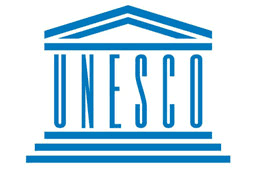
According to UNESCO, “Indigenous communities, peoples and nations are those which, having a historical continuity with pre-invasion and pre-colonial societies that developed on their territories, consider themselves distinct from other sectors of the societies now prevailing on those territories, or parts of them. They form at present non-dominant sectors of society and are determined to preserve, develop and transmit to future generations their ancestral territories, and their ethnic identity as the basis of their continued existence as peoples, in accordance with their own cultural patterns, social institutions and legal system.” The term indigenous is, of course, contestable and relative to where you are in the world. If you are a semi-nomadic member of the Penan people at the heart of Borneo, you may not feel "indigenous" as such. The very fact that we use the term indigenous to refer to the communities mentioned by UNESCO, highlights the problematic nature of the status of these societies and communities in the contemporary, globalised world. In this respect, it is important not to make sweeping statements regarding members of indigenous communities. Not all indigenous communities are the same and, just like not every Englishman thinks the same way, there is obviously a wealth of diversity in thinking and beliefs within the indigenous communities as well.
|
|
How do indigenous societies know?
Reflection:
What methods have indigenous peoples developed to support the recording, preservation and protection of their traditional knowledge? Are these methods reliable? How are they different from the methods you may be familiar with?
What methods have indigenous peoples developed to support the recording, preservation and protection of their traditional knowledge? Are these methods reliable? How are they different from the methods you may be familiar with?
Researchers have uncovered a list of characteristics associates with indigenous and non-indigenous ways of thinking. The (contrasts between these) characteristics may help you understand how indigenous peoples acquire knowledge. You are most likely influenced by the paradigm on the left, because of your schooling and the language you speak. However, "The world does not exist in an absolute sense" (Davis). There may exist other, valuable explanations. What you accept as knowledge depends much on "the model of reality you are most familiar with" (Davis).
|
Dominant paradigm Western science Scientific method Evidence/explanation in physical world Understanding how Education at school formal education Media Written tradition Part to whole Hypothesis falsification Skepticism |
Indigenous knowledge Education through life Language (metaphor) Nature/ecology Oral history/stories (generally not documented) Tradition and inherited wisdom Holistic Locally bound Closely related to survival Culture and context specific Non-formal Practical applications Physical and metaphysical world |
“We’ve moved from wisdom to knowledge, and now we’re moving from knowledge to information, and that information is so partial- that we’re creating incomplete human beings.” |
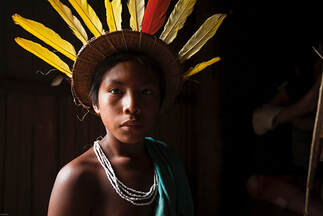
"Take, for example, this child of a Barasana in the Northwest Amazon, the people of the anaconda who believe that mythologically they came up the milk river from the east in the belly of sacred snakes. Now, this is a people who cognitively do not distinguish the color blue from the color green because the canopy of the heavens is equated to the canopy of the forest upon which the people depend."
(Wade Davis, TED)
(Wade Davis, TED)
|
"To this day, [The Kogi] remain ruled by a ritual priesthood but the training for the priesthood is rather extraordinary. The young acolytes are taken away from their families at the age of three and four, sequestered in a shadowy world of darkness in stone huts at the base of glaciers for 18 years: two nine-year periods deliberately chosen to mimic the nine months of gestation they spend in their natural mother's womb; now they are metaphorically in the womb of the great mother. And for this entire time, they are inculturated into the values of their society, values that maintain the proposition that their prayers and their prayers alone maintain the cosmic -- or we might say the ecological -- balance. And at the end of this amazing initiation, one day they're suddenly taken out and for the first time in their lives, at the age of 18, they see a sunrise. " (Davis, TED)
|
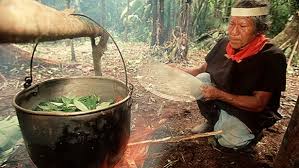
On the picture below you see a Cofan shaman preparing ayahuasca, which is a powerful psychoactive preparation. To make ayahuasca, you need two elements, otherwise they don't do the trick (=make you high). To know exactly which two elements to combine, you need exceptional knowledge of the plants. You could approach this problem (which plants to combine) in a Western scientific way. or the indigenous shaman way. Wade Davis explains it as follows in his fascinating TED talk: "[Ayahuasca] is made really of two different sources: on the one hand, this woody liana which has in it a series of beta-carbolines, harmine, harmaline, mildly hallucinogenic -- to take the vine alone is rather to have sort of blue hazy smoke drift across your consciousness -- but it's mixed with the leaves of a shrub in the coffee family called Psychotria viridis. This plant had in it some very powerful tryptamines, very close to brain serotonin, dimethyltryptamine, 5-methoxydimethyltryptamine. [...] the thing about tryptamines is they cannot be taken orally because they're denatured by an enzyme found naturally in the human gut called monoamine oxidase.They can only be taken orally if taken in conjunction with some other chemical that denatures the MAO. Now, the fascinating things are that the beta-carbolines found within that liana are MAO inhibitors of the precise sort necessary to potentiate the tryptamine. So you ask yourself a question. "How, in a flora of 80,000 species of vascular plants, do these people find these two morphologically unrelated plants that when combined in this way, created a kind of biochemical version of the whole being greater than the sum of the parts? [...] Well, we use that great euphemism, "trial and error," which is exposed to be meaningless. But you ask the Indians, and they say, "The plants talk to us." [...] Well, what does that mean? This tribe, the Cofan, has 17 varieties of ayahuasca, all of which they distinguish a great distance in the forest, all of which are referable to our eye as one species. And then you ask them how they establish their taxonomy and they say, "I thought you knew something about plants. I mean, don't you know anything?" And I said, "No." Well, it turns out you take each of the 17 varieties in the night of a full moon, and it sings to you in a different key."
|
|
Dominant discourse and indigenous knowledge
Reflection: Does the term “indigenous knowledge” necessarily suggest power divisions between a dominant and non-dominant group?
Our world view is shaped by our language, our cultural background and years of education. Yet, the world does not exist in an absolute sense. As Wade Davis illustrates in his TED talk on endangered cultures, we could perhaps speak of 'multiple models of reality' instead. The methods we employ to gather knowledge are heavily influenced by the model of reality we are most familiar with. In some cases these models of reality offer mutually inconsistent explanations and it may be difficult to argue that they can truly co-exist. In others, however, they may complement each other and the range of perspectives leads to better knowledge.
In this context, it is important to remember that how we know and what you accept as knowledge is to some extent dependent on your education, the language you speak and the time in which you were born. At this point in time, a lot of knowledge is produced and passed on via the means of the English language. Much of your thinking is influenced by post-Enlightenment ideals. Knowledge you learn at school is "Westernised" in some sort of a way, even if you are not currently living in "the West". In a way, our knowledge is shaped by post-imperialism. True, many Western countries don't exactly exert explicit political power over their former colonies, but when it comes to values and ideas, their influence arguably still prevails. Although the western scientific paradigm has been fantastic at driving progress in many areas, we should not forget that our adherence to the dominant discourse (=way of thinking and speaking) gives us the illusion that there is only one way of viewing the world. What if, for some reason, Bhutan rather than the UK, dominated over 20% of the world population at the beginning of the 20th century? How would that affect the way you know?
Indigenous communities often live at the edge of societies. They are not only marginalised economically, but also culturally. Their ideas, languages and ways of thinking are slowly disappearing due to the presence of more dominant cultures and discourse.
In this context, it is important to remember that how we know and what you accept as knowledge is to some extent dependent on your education, the language you speak and the time in which you were born. At this point in time, a lot of knowledge is produced and passed on via the means of the English language. Much of your thinking is influenced by post-Enlightenment ideals. Knowledge you learn at school is "Westernised" in some sort of a way, even if you are not currently living in "the West". In a way, our knowledge is shaped by post-imperialism. True, many Western countries don't exactly exert explicit political power over their former colonies, but when it comes to values and ideas, their influence arguably still prevails. Although the western scientific paradigm has been fantastic at driving progress in many areas, we should not forget that our adherence to the dominant discourse (=way of thinking and speaking) gives us the illusion that there is only one way of viewing the world. What if, for some reason, Bhutan rather than the UK, dominated over 20% of the world population at the beginning of the 20th century? How would that affect the way you know?
Indigenous communities often live at the edge of societies. They are not only marginalised economically, but also culturally. Their ideas, languages and ways of thinking are slowly disappearing due to the presence of more dominant cultures and discourse.
Indigenous peoples have the right to maintain, control, protect and develop their cultural heritage, traditional knowledge and traditional cultural expressions, as well as the manifestations of their sciences, technologies and cultures”.
2007 UN Declaration on the Rights of Indigenous Peoples
|
|
Culture, knowledge and indigenous peoples
Is it possible to have true knowledge of a culture in which we have not been raised? Perhaps not, but it is worth opening our eyes to the beautiful tapestry of cultures and communities of knowers around the world.
|
Photographer Réhahn, who is based in Vietnam, travelled around the world to capture the smiles and stories of indigenous peoples. His award winning photos remind us of the heritage we sometimes forget about. These wonderful peoples and their life stories are all too often marginalised due to globalisation and modernisation. In Vietnam, things are changing particularly fast. These are interesting times, but also times when we have to take a step back and consider whether we really all need to think, dress, eat and believe in the same way. Réhahn's photos remind us of the importance to preserve the "ethnosphere" (term coined by Wade Davis, TED). Students at BIS Vietnam can visit his gallery in HCMC. For more information on his projects, click here.
|
|
|
|
"Photographer Jimmy Nelson spent nearly three years visiting 31 remote and unique tribes and cultures around the world, witnessing their rituals and capturing their traditional dresses, jewellery, weapons and symbols in a series of beautiful portraits. His book, Before They Pass Away, is published by teNeus"
(The Guardian, 8th November 2013) |
Wade Davis on TED on endangered cultures
Wade Davis's brilliant talks illustrate how indigenous communities acquire knowledge and make sense of their world. Davis argues that the explanations we are the most familiar with are not the only possible explanations. His very well illustrated talks highlight the dangers of cultural and linguistic imperialism.
|
|
|
|
|
Reflection: Does the diversity of moral practices that we see in indigenous societies around the world support the case for moral relativism?
|
|
Language and indigenous knowledge
|
The connection between the language used by indigenous people and the knowledge this language represents has been the root of debate amongst cognitive scientists, linguists and anthropologists around the world. The thought provoking video about the Piraha language is a good TOK stimulus. You wish to consider on what grounds Chomsky makes his claims. How should/could human scientists verify the claims they make about the connection between language and thought about societies that are very different from theirs? What could be considered a fact or evidence in the field of anthropology, cognitive science and cognitive linguistics?
|
|
Possible knowledge questions on Indigenous Knowledge
Acknowledgement: these knowledge questions are taken from the official IBO TOK guide (2022 Specification)
|
Scope
Methods and tools
|
Ethics
Perspectives
|
Making connections to the core theme, as suggested by the TOK Guide:
• To what extent are we aware of the impact of our culture(s) on what we believe or know?
• Is it possible to have knowledge of a culture in which we have not been raised?
• As an “outsider”, can we know and speak about the knowledge held by a different cultural group?
• Is it possible to have knowledge of a culture in which we have not been raised?
• As an “outsider”, can we know and speak about the knowledge held by a different cultural group?

















